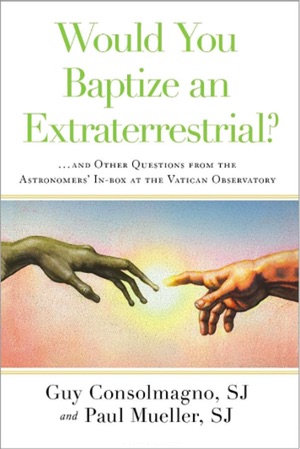Review: Would You Baptize an Extraterrestrial?by Jeff Foust
|
| They suggest Galileo may have had it coming: “Galileo’s style of argument humiliated people… when Galileo got into trouble, it was payback time.” |
The book takes the form of a series of conversations between Consolmagno and Mueller, one chapter for each of the half-dozen questions they examine. The reader is, in essence, listening in on a conversation between two friends in various locales, both real and fictional (from the Art Institute of Chicago to Antarctica to Douglas Adams’ Restaurant at the End of the Universe) as they discuss and debate the topics.
Some of the topics they discuss are not surprising: the origin of the universe, the end of the world (or universe), and what astronomical phenomenon could have been responsible for the Star of Bethlehem. In another chapter, the duo moves from astronomy to history in an effort to try and rehabilitate the reputation of the Catholic Church regarding its treatment of Galileo. They suggest Galileo may have been the victim of politics linked to the Thirty Years War when he was arrested and put on trial by the church. And, they suggest, Galileo may have had it coming: “Galileo’s style of argument humiliated people… when Galileo got into trouble, it was payback time.”
Overall, the authors are relatively conciliatory when it comes to science and religion. The issue of science and faith is not an either-or proposition for them, and they disagree with fundamentalists who believe religion must triumph over science, or vice versa. That discussion hits a sour note, though, at one point, where Consolmagno discusses how his “techie friends” apply the so-called Cosmological Principle, which argues that no location in spacetime is privileged. “These techies are guys, after all, who often tend to have pretty rough experiences with their personal lives,” he writes. “For them, love is vaporware. Science works.” Many such “techies” would likely argue that love and science are compatible without the need for religion.
Not everything in Would You Baptize an Extraterrestrial? is a discussion of reconciling science and religion. One chapter is devoted to the reclassification of Pluto as a dwarf planet, one that focuses almost exclusively on the debate leading up to the decision at the 2006 International Astronomical Union (IAU) meeting to assign Pluto to the new category of “dwarf planet.” Consolmagno was involved in that debate, serving on IAU committees dealing with the issue, so he offers an interesting insider’s perspective on the process. “Those present at the IAU General Assembly, including those (like me) whose ‘side’ had lost, felt that we had, indeed, had a fair hearing,” he concludes. “I am satisfied that the procedure was as fair as the IAU could have made it.”
And what of the question posed in the book’s title? It was a question posed by Pope Francis last May, when he asked, “Imagine if a Martian showed up… and he asked to be baptized?” but the authors note they have been asked versions of that question for years. (The short answer they offer is yes, provided both the hypothetical extraterrestrial was willing and the Church gave its approval.) The argument they make there, and elsewhere in the book, is that science and religion—at least their faith—need not be incompatible.
